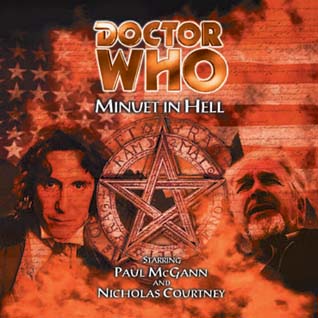
Released April 2001
‘Minuet in Hell,’ the finale to Paul McGann’s maiden ‘season’ with Big Finish, is a tale full of potential that, unfortunately, never fails to deliver everything that it is setting up and promising. The setting and plot are filled with horror, a genre that has served Doctor Who well in the past, and whether McGann is describing the Gallifreyan legends of hell, the plot is dealing with prostitution and mental illness, or the Doctor is facing a lobotomy as he struggles to find his identity, there are a lot of very genuinely scary goings-on throughout the script. Unfortunately, despite these dark and intriguing concepts, the suspect supporting performances, shoddy pacing, and overreliance on unnecessary nods to continuity and past adventures make ‘Minuet in Hell’ fall flat.
In theory, the Doctor being in an asylum and being unsure if he is truly a time traveler or just delusional while facing a man claiming to be the Doctor should work wonders and progress the story easily. However, there is absolutely no question about who the Doctor truly is and so rather than creating an exciting mysterious dynamic, this gimmick instead turns into a grinding plot point that only serves to fill time. Nicholas Briggs is very good as Gideon Crane, the man who has the Doctor’s memories but keeps his own personality, and within the story there is good drama with this premise, but from a listener’s standpoint it carries on a little too long. Given all of the references to past adventures and companions, though, it is glaringly odd that the simple solution of determining who the Gallifreyan is by checking for two hearts is never once mentioned.
McGann is utterly arresting as always, effortlessly selling the Doctor’s self-doubt and occasional joy when unsure of his identity and then his casual determination when dealing with the matter at hand later on. Unfortunately, the characterization of Charley is still treading water at this point, despite another very strong performance from India Fisher. She finally gets to show some true emotion and peril when dealing with the Psionovores in this tale, but otherwise the writers have seen fit so far to just keep her as a sarcastic young woman who’s unafraid of consequences. There certainly are worse traits for a companion to have, but hopefully the character progresses and reaches different levels when returning for the next block of episodes.
‘Minuet in Hell’ most famously, though, allows for Brigadier Lethbridge-Stewart to cross paths with the Eighth Doctor, and Nicholas Courtney is once again superb in his familiar role. The Brigadier working as a diplomat is an inspired move given his advanced age in this tale, and it allows him to be written in a very honourable and proactive light. Even as the farcical caricature that is the main plot involving the Hellfire Club and the establishment of a fifty-first state names Malebolgia carries on, Courtney lends a significant air or respect to the proceedings as he tries to figure out just what the mysterious Dashwood is doing. There is certainly some of the early Big Finish adventure exposition problems present, but at least the Brigadier reading aloud to himself as he types is a more natural reason for them here.
Regrettably, the supporting characters are all walking stereotypes that never manage to elevate above standard stock. Worse yet, the American accents on display are truly awful and grating to listen to. Any sense of realism for this story instantly goes out the window once the non-British accents start filling scenes. Dashwood is the hackeneyed ranting lunatic who brings about his own undoing by so generously explaining all of his plans to the Brigadier by story’s end; Marchosias, another villainous presence, feels the need to continually offer terrible wisecracks as he gets his point across. Pickering as a blackmailing but deadly serious Christian fares little better, and the two female characters Dale Pargeter and Becky Lee Kowalczyk are written appallingly from the start with little merit to either.
Putting ‘Hell’ in a title is a bold move; unless the story is superb, there will inevitably be jokes and puns made about just what the experience of the release is like. With a very cartoony depiction of political and social events, little drama regarding the unsure state of the Doctor, and the worst collection of American accents imaginable, ‘Minuet in Hell’ is surely a story with more negatives than positives. As strong as McGann and Courtney are, and as important as this story is for finally bringing the two together, two performances can only do so much when facing such insurmountable odds.
- Release Date: 3/2001


Leave a Reply